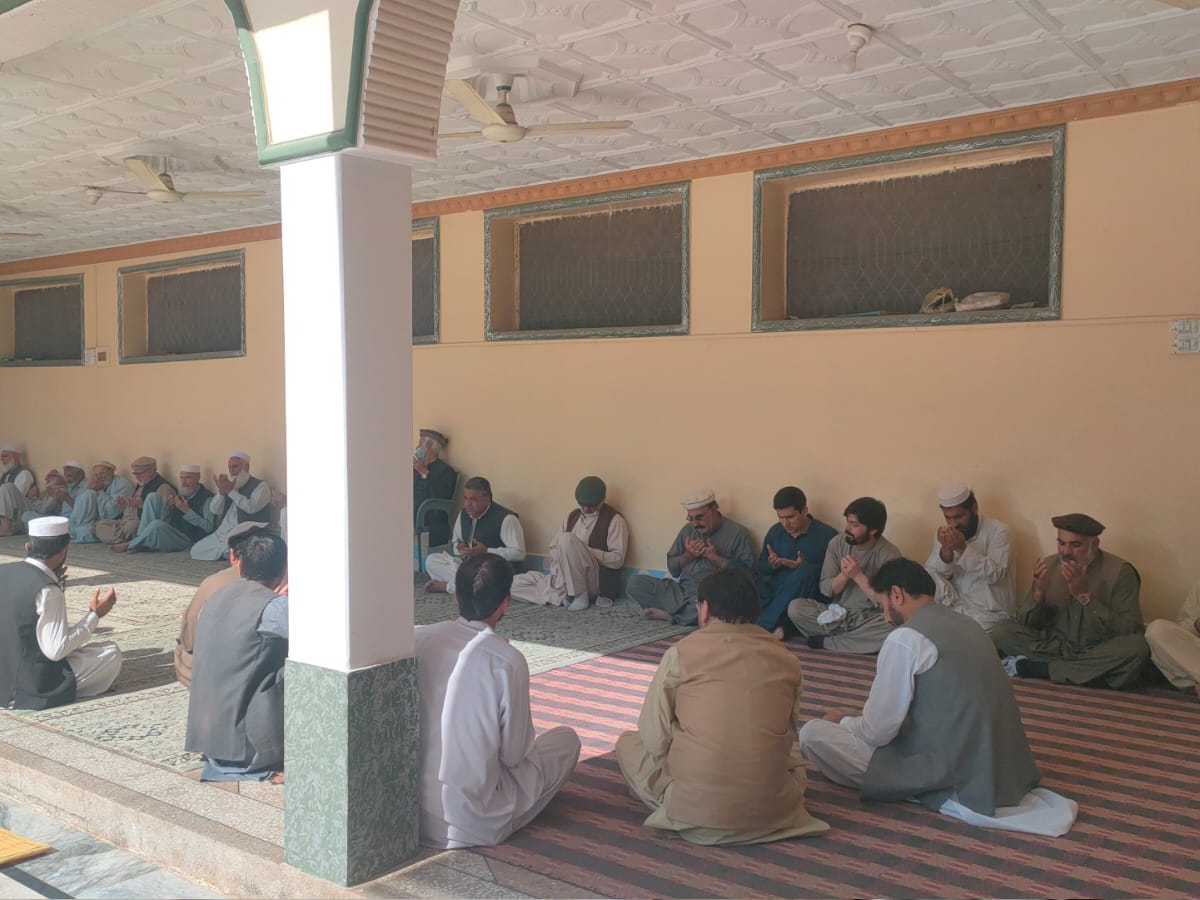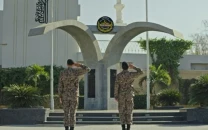Fateha Khwani for slain TTP deputy chief continues for second consecutive day in Dir
Slain commander Qari Amjad’s funeral held publicly with security approval

Fateha for the slain deputy chief of the outlawed Tehreek-e-Taliban Pakistan (TTP), Qari Amjad, continued for a second consecutive day on Saturday at the main mosque of Mayar Jandool. Large number of relatives, local residents, and friends from surrounding villages participated in the prayers.
According to family sources, the condolence gatherings will continue for three days in line with local customs and traditions. Qari Amjad, whose real name was Amjad Ali, was killed along with three associates in an intelligence-based operation near the Pakistan-Afghanistan border in Bajaur on the night between Wednesday and Thursday.
Military authorities handed over his body to the family on Thursday. The following morning, his remains were transported to his ancestral village, Mayar Jandool, where funeral prayer was offered at the central graveyard. The funeral, attended by hundreds, was held openly with permission from security forces—an unusual move for a senior TTP leader, as such gatherings are normally restricted following the deaths of terrorist commanders.
Read: Torkham border partially reopens after 21-day closure for Afghan deportations
Family sources said Qari Amjad was the son of Muhammad Siddiq Akhunzada, a local schoolteacher who passed away in 2001. Qari Amjad received his early religious education at a madrassa in Shahpur, Shangla, and later completed a Mufti course in Karachi. He, along with his younger brother Wajid Ali, joined the banned TTP in 2007. Wajid was killed in 2010 during a clash with security forces in Samar Bagh after planting an IED.
Known within the TTP ranks as Mufti Mazahim and Hazrat Mufti Deeroji, Qari Amjad married a woman from Khanpur Tekeni in 2007 and had two sons and four daughters. The family later moved to Afghanistan, where he lived for several years. His eldest son, now 18, is studying at a religious seminary in Afghanistan, where the rest of the family still resides.

Fateha for Qari Amjad Ali underway at Mayar Jandool mosque in Dir. Photo: Express
Two of his stepbrothers, Abdul Majid and Muhammad Farooq, live in Mayar Jandool. Majid works as a schoolteacher. Two uncles, Muhammad Saleem and Ghulam Nasir Akhunzada, were detained by security forces in 2010 following Qari Amjad’s emergence as a TTP figure and were held for 18 months at the Blambat Scouts Fort before being cleared.
Sources said Qari Amjad rose through the ranks during his stay in Afghanistan to become the deputy to the current TTP Chief, Noor Wali Mehsud. In 2022, the United States designated him a global terrorist, accusing him of cross-border attacks and terrorist operations, while Pakistan had placed a bounty of Rs5 million on his head.
In a statement released on social media, the TTP described his killing as a 'betrayal', while Pakistani authorities termed it the outcome of a precise intelligence-based operation.
Also Read: PM vows full support to K-P govt for peace
Conflicting reports have since emerged, with some claims suggesting that he was killed inside Pakistan rather than across the border.
The villagers have great respect for him because due to his presence TTP spared his Mayar village and did not interfere with the locals compared to the rest of the district where people were frequently kidnapped and killed.
Sources said that he also worked as the caretaker of the same mosque where his fateha is offered currently. His mother died during his childhood after which his father sent him to a religious seminary for education where he was radicalised. His clan is known as Akunzada family and are considered educated as per local standards.
His family members believed that he was tricked into coming to Pakistan and then killed otherwise he was a difficult target.
His first wife is a local from Lower Dir while his second wife is a Yamni woman. His elder son is also married and settled in Afghanistan.
Pak Afghan tension
After years of relative decline, terrorist activities have been rising again since the fall of Kabul in 2021 and the Taliban’s return to power in Afghanistan. Terrorist groups, including the Tehreek-e-Taliban Pakistan (TTP), have been emboldened, posing a renewed threat to national security.
Following continuous terrorist attacks from across the border, security forces launched a relentless counter-terrorism campaign under the vision of Azm-e-Istihkam. Approved by the Federal Apex Committee on the National Action Plan, the operation continued at full pace to eliminate the menace of foreign-sponsored and supported terrorism from the country.
Relations between Pakistan and Afghanistan have deteriorated, as terrorist activities have risen again since the fall of Kabul in 2021 and the Taliban’s return to power. Terrorist groups, including Tehreek-e-Taliban Pakistan (TTP), have been emboldened, posing a renewed threat to national security.
Read: Khawaja Asif dismisses Afghan claim that TTP militants are ‘Pakistani refugees’
Pakistan raised concerns over Afghanistan’s continued sheltering of the proscribed Tehreek-e-Taliban Pakistan and other militant outfits, with Prime Minister Shehbaz Sharif warning that any aggression from across the border would be considered 'crossing Pakistan’s red line'.
The presence of militant groups in Afghanistan under Taliban rule remains a key source of regional tension. Countries such as Russia, Iran, and China — despite maintaining diplomatic ties with the Taliban — have repeatedly urged the group to prevent Afghan soil from being used for cross-border attacks. Militant strikes against security forces have persisted, prompting Pakistan’s military to take decisive action and target terrorist strongholds across the border.
Tensions escalated last month when clashes erupted after Taliban forces opened unprovoked fire at multiple locations in K-P and Balochistan. The Pakistan Army responded swiftly, destroying several Afghan posts and killing dozens of Afghan soldiers and militants.
A ceasefire was brokered late last month in talks hosted by Qatar, but tensions remain as both parties again hold dialogues in Istanbul, while border trade remains suspended.
After six days of high-level talks in Istanbul, Pakistan and the Afghan Taliban reached an interim understanding this week aimed at preventing the use of Afghan soil for terrorist activities against Pakistan and at taking decisive action against India-backed militant groups, including the Tehreek-e-Taliban Pakistan (TTP) and the Balochistan Liberation Army (BLA).



















COMMENTS (1)
Comments are moderated and generally will be posted if they are on-topic and not abusive.
For more information, please see our Comments FAQ